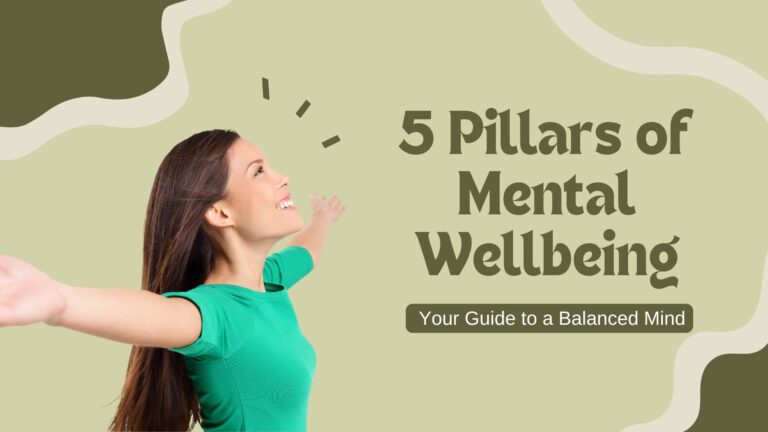Maintaining mental well-being is essential for leading a fulfilling life. Just like a house needs a strong foundation, our mental health relies on several key pillars that support our overall well-being. Understanding these pillars can help you create a balanced mind and enhance your quality of life. Let’s explore the five pillars of mental well-being and how you can cultivate each one.
1. Emotional Resilience
What Is Emotional Resilience?
Emotional resilience refers to our ability to adapt to stress and bounce back from adversity. It’s the inner strength that allows us to face challenges, setbacks, and emotional upheavals without losing our balance.
How to Cultivate Emotional Resilience
- Practice Positive Thinking: Challenge negative thoughts and replace them with positive affirmations.
- Develop Coping Strategies: Identify healthy ways to cope with stress, such as journaling, meditation, or engaging in hobbies.
- Embrace Change: Accept that change is a part of life and view challenges as opportunities for growth.
2. Healthy Relationships
The Importance of Strong Connections
Healthy relationships provide emotional support, foster a sense of belonging, and enhance our overall happiness. They play a crucial role in our mental well-being.
Building and Maintaining Relationships
- Communicate Openly: Share your feelings and thoughts with trusted friends and family.
- Be Supportive: Offer your help and listen to others without judgment.
- Engage in Activities Together: Spend quality time with loved ones to strengthen your bond, whether through shared hobbies or simple conversations.
3. Sense of Purpose
Why Having a Purpose Matters
A sense of purpose gives your life direction and meaning. It can come from various sources, such as work, volunteering, or personal passions. When you have clear goals, you are more motivated and fulfilled.
Finding Your Purpose
- Reflect on Your Values: Consider what matters most to you and how you can align your activities with your values.
- Set Achievable Goals: Break larger goals into smaller, manageable steps to stay motivated.
- Explore New Interests: Try new activities or hobbies to discover what you’re passionate about.
4. Healthy Lifestyle Choices
The Connection Between Physical and Mental Health
A balanced lifestyle contributes significantly to mental well-being. Physical health impacts mood, energy levels, and overall mental clarity.
Tips for a Healthy Lifestyle
- Exercise Regularly: Aim for at least 30 minutes of physical activity most days. Exercise releases endorphins, which can elevate your mood.
- Eat a Balanced Diet: Fuel your body with nutritious foods to support your physical and mental health.
- Prioritize Sleep: Aim for 7-9 hours of quality sleep each night to improve mood and cognitive function.
5. Effective Coping Skills
What Are Coping Skills?
Coping skills are strategies we use to manage stress and emotional challenges. Effective coping can help mitigate the negative effects of stress and enhance overall well-being.
Developing Effective Coping Strategies
- Mindfulness and Meditation: Practicing mindfulness can help you stay present and reduce anxiety.
- Deep Breathing Exercises: Incorporate deep breathing into your routine to calm your mind during stressful situations.
- Seek Support When Needed: Don’t hesitate to reach out to friends, family, or professionals for help during tough times.
Conclusion
Understanding and nurturing the five pillars of mental well-being—emotional resilience, healthy relationships, a sense of purpose, healthy lifestyle choices, and effective coping skills—can significantly enhance your mental health. By focusing on these areas, you can cultivate a balanced mind and lead a more fulfilling life. Remember, the journey to mental well-being is personal and ongoing, so take small steps each day toward achieving your goals.
FAQs
How can I improve my emotional resilience?
Improving emotional resilience involves developing coping strategies, practicing mindfulness, maintaining a positive outlook, and building a support network. Engaging in self-care activities and reflecting on past experiences to learn and grow can also enhance resilience.
Why are positive relationships important for mental well-being?
Positive relationships provide emotional support, reduce feelings of loneliness, and enhance overall happiness. Strong social connections can improve coping abilities and help individuals feel more understood and valued, contributing significantly to mental health.
What role does physical health play in mental well-being?
Physical health and mental well-being are closely linked. Regular exercise, a balanced diet, and sufficient sleep can boost mood, reduce anxiety and stress, and improve cognitive function. Taking care of your body can have profound effects on your mind.
When should I seek professional help for my mental health?
It’s important to seek professional help if you’re experiencing persistent feelings of sadness, anxiety, or stress that interfere with daily life. If coping strategies are ineffective, or if you have thoughts of self-harm or suicide, reaching out to a mental health professional is crucial. Seeking help is a sign of strength and a step toward better mental health.


